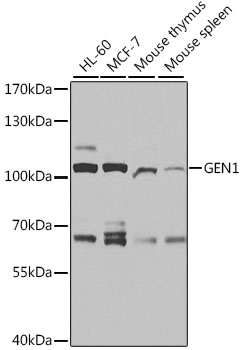-
Product Name
GEN1 Polyclonal Antibody
- Documents
-
Description
Polyclonal antibody to GEN1
-
Tested applications
WB
-
Species reactivity
Human, Mouse
-
Alternative names
GEN1 antibody; Gen antibody; flap endonuclease GEN homolog 1 antibody
-
Isotype
Rabbit IgG
-
Preparation
Antigen: Recombinant fusion protein containing a sequence corresponding to amino acids 669-908 of human GEN1 (NP_872431.3).
-
Clonality
Polyclonal
-
Formulation
PBS with 0.02% sodium azide, 50% glycerol, pH7.3.
-
Storage instructions
Store at -20℃. Avoid freeze / thaw cycles.
-
Applications
WB 1:500 - 1:2000
-
Validations

Western blot - GEN1 Polyclonal Antibody
Western blot analysis of extracts of various cell lines, using GEN1 antibody at 1:1000 dilution.Secondary antibody: HRP Goat Anti-Rabbit IgG (H+L) at 1:10000 dilution.Lysates/proteins: 25ug per lane.Blocking buffer: 3% nonfat dry milk in TBST.Detection: ECL Basic Kit .Exposure time: 30s.
-
Background
Endonuclease which resolves Holliday junctions (HJs) by the introduction of symmetrically related cuts across the junction point, to produce nicked duplex products in which the nicks can be readily ligated. Four-way DNA intermediates, also known as Holliday junctions, are formed during homologous recombination and DNA repair, and their resolution is necessary for proper chromosome segregation. Cleaves HJs by a nick and counter-nick mechanism involving dual coordinated incisions that lead to the formation of ligatable nicked duplex products. Cleavage of the first strand is rate limiting, while second strand cleavage is rapid. Largely monomeric, dimerizes on the HJ and the first nick occurs upon dimerization at the junction. Efficiently cleaves both single and double HJs contained within large recombination intermediates. Exhibits a weak sequence preference for incision between two G residues that reside in a T-rich region of DNA. Has also endonuclease activity on 5'-flap and replication fork (RF) DNA substrates.
Related Products / Services
Please note: All products are "FOR RESEARCH USE ONLY AND ARE NOT INTENDED FOR DIAGNOSTIC OR THERAPEUTIC USE"
